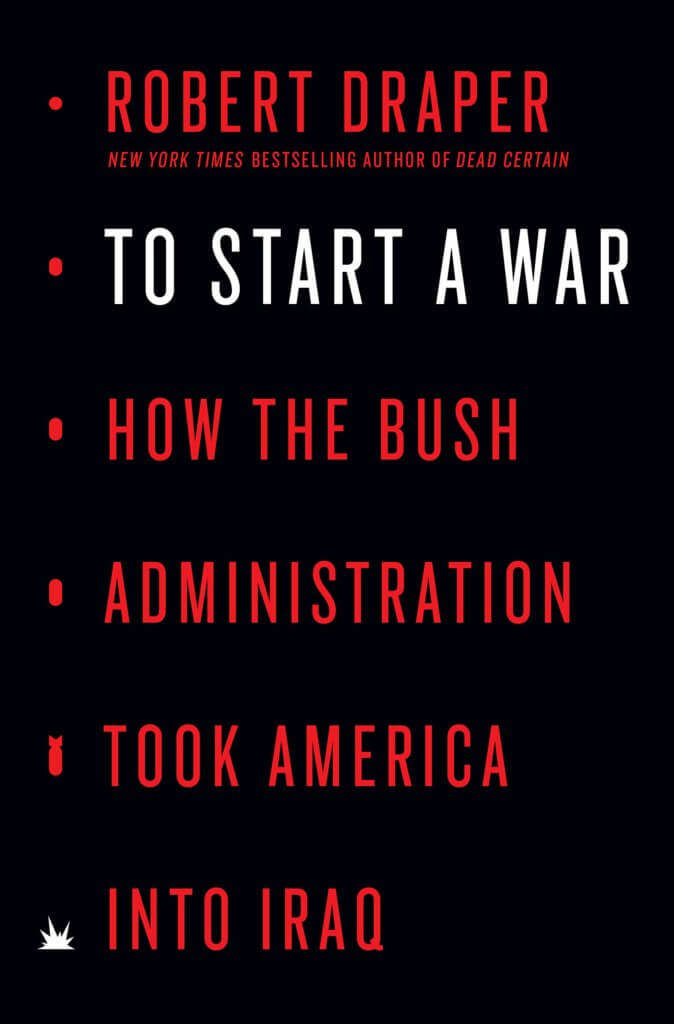TO START A WAR
How the Bush Administration Took America Into Iraq
By Robert Draper
Penguin Press, 480 pp., $30
Robert Draper is a veteran journalist and a staff reporter at the New York Times magazine. He has just published a comprehensive look at how the U.S. decided to invade Iraq in 2003. His stunning, thorough account is based largely on interviews with some 300 people, including just about all the major figures except George W. Bush himself. So why did the New York Times Book Review assign only an 11-paragraph review, which it buried on page 15? Especially as Draper’s study is not only historically indispensable, but is also an up-to-date warning that the U.S. could be tricked into a war with Iran, with some of the same culprits responsible?

Quite possibly, Times editors were embarrassed by Draper’s Chapter 17, “Truth and the Tellers,” which is a brilliant dissection of how the mainstream U.S. media, including his own paper, joined in the drumbeat for war. Draper points out that Times reporter Judith Miller, who was eventually professionally disgraced for reporting false stories about Iraq’s (non-existent) weapons of mass destruction leaked by pro-war Bush officials, was actually something of a scapegoat. The paper’s top brass, including executive editor Howell Raines, encouraged her and others, while sidelining skeptical reports by different reporters. Draper notes that Miller “was certainly not responsible for the [articles] written by her colleagues that the Times editors decided not to publish.”
He writes that the poor coverage was not universal. Knight-Ridder reporter Warren Strobel and his colleagues did write reports skeptical of the administration’s dishonest claims about Iraq’s weapons. But the Knight-Ridder papers were
. . . not situated in the Beltway and not driving Washington’s daily narrative. . . while the reporters at the Times were ever conscious of their status in the top echelon. . . Careers could be made by wars. It was equally true that wars could be made by careerists, including those in newsrooms.
How much of a role did Israel, or pro-Israel neoconservatives, play in the rush toward invasion? Draper points out that Douglas Feith, an undersecretary in Donald Rumsfeld’s Defense Department, was vigorous and influential. Right after the September 11, 2001 attacks, Feith immediately looked for (non-existent) links between the hijackers and Saddam Hussein. Draper explains:
Feith, whose father had been a committed Zionist and whose grandparents had been murdered in concentration camps, was an ardent supporter of Israel and believed Saddam to be that country’s greatest foe.
Draper reports that Israel surely did form part of George W. Bush’s pro-invasion calculations. His father’s Secretary of State, Jim Baker, had warned: “Those neocons are going to eat George W. alive. The only one who could protect him would be (Secretary of State Colin) Powell. But Powell doesn’t know his own strength. He’s the good soldier.” And Bush Junior himself had told British Foreign Secretary Jack Straw that “my dad got burned by the Israeli lobby in 1992, and I don’t want to fall into the same trap.”
But Douglas Feith and other neoconservative zealots were not the ultimate deciders. Draper concludes that George W. Bush decided early on that he wanted to attack Iraq, for a complex mix of motivations that also included his compulsion to strike back somewhere after September 11, and because he blamed Saddam Hussein for (allegedly) planning to assassinate his father back in 1993. The officials around Bush recognized the president’s bellicose inclinations, and they chose cowardice, rigging the intelligence to tell Bush what he wanted to hear. Many of them later confessed to Draper that although they had doubts, they had stayed quiet. Draper put it diplomatically
Though the decision was finally his and only his to make, it will never be known what George W. Bush’s course of action would have been if, during the spring, summer, and fall months of 2002, even one member of his administration had tested his professed receptiveness to an argument against war.
The high-level cowardly group-think prompted some astonishing incompetence. At least the idea that Iraq would turn out to have hidden weapons of mass destruction was plausible, if not backed by any proof. But the invaders made ridiculous mistakes that ended up being lethal. First, the majority of Bush’s advisers decided that an exile named Ahmad Chalabi should lead the new Iraq after Saddam was overthrown, (and a surprising number of journalists joined the Chalabi fan club). It is a mystery how sentient adults could have believed that this man, accurately regarded by many others who met him as a charlatan, who had been charged with bank embezzlement in Jordan, and who had not been in Iraq for nearly half a century, could preside over reconstruction.
It got worse. Draper reports in detail how the Bush administration’s invaders made no plans for administering post-war Iraq. Within weeks, they replaced their first pro-consul, Jay Garner — with L. Paul (Jerry) Bremer, a bureaucrat who, Draper points out dryly, “had no work experience in the Middle East.” Bremer promptly made the fatal decision to disband the Iraqi army — “in one fell swoop putting 350,000 armed Iraqi men out of work.” The Iraqi resistance naturally began almost immediately. So far, 4,583 American service men and women, and at least 288,000 Iraqi people, have paid with their lives for the Bush administration’s incompetence.
The Iraq tragedy is relevant today. On September 14, Donald Trump made up a new threat from Iran, and tweeted: “Any attack by Iran, in any form, against the United States will be met by an attack on Iran that will be 1,000 times greater in magnitude!” Trump sounds unhinged — until you recall that just this January, he provocatively ordered the assassination of Iran’s General Qasem Soleimani — and got little resistance from either the mainstream U.S. press or the foreign policy establishment. Cowardly group-think didn’t end with Iraq.



Sounds interesting.
I’ve always thought the man pictured on the cover was a big factor.
An uninformed and intellectually dull man. One desperate to distinguish himself despite having no talents or learning.
Absolutely keen on outdoing his father in something, he fell in with “the Bush Sr didn’t finish the job” crowd.
He fell under the spell of some of the most brutal Neocons we’ve seen, Cheney and Rumsfeld.
He also was putty in the hands of Ariel Sharon.
I read recently that Dubya asked Prince Bandar what to do about foreign policy, since he (Dubya) was a domestic policy guy. Bandar advised Bush to do whatever the Israelis wanted. That fits the reality that unfolded. This book resembles Gerald Posner’s “Case Closed”, with Dubya as the patsy. Remember, Netanyahu said 9/11 was “good for Israel” precisely because it could bring American troops into Israel’s war. Yes, Dubya was stupid, but he was merely a useful idiot.
The ongoing tragedy in Iraq further confirms that George Bush Sr. was correct when he chose not to occupy Baghdad & depose Sadaam Hussein in 1991. It also brings to mind the long since forgotten words of then Vice President Dick Cheney as quoted by the New York Times on 13 April 1991, when he was secretary of defense: “Once you’ve got Baghdad, it’s not clear what you will do with it. It’s not clear what kind of government you would put in place of the one that’s currently there now. Is it going to be a Shia regime, a Sunni regime or a Kurdish regime? Or one that tilts toward the Ba’athists, or one that tilts toward the Islamic fundamentalists. How much credibility is that government going to have if it’s set up by the United States military when it’s there? How long does the United States military have to stay to protect the people that sign on for the government, & what happens to it once we leave?”
Well over one million Iraqis died as a result of America and its allies’ invasion of Iraq in 2003 and subsequent occupation. Hundreds of thousands of Iraqis were turned into refugees and their country’s infrastructure was destroyed. Blood thirsty George Bush Jr. & his obedient buddy, Britain’s P.M. at the time, Tony Blair (aka, Toady Bliar) and several others are undeniably war criminals.
The staggering death toll in Iraq:
https://www.salon.com/2018/03/19/the-staggering-death-toll-in-iraq_partner/
EXCERPTS:
“Two such reports on Iraq came out in the prestigious The Lancet medical journal, first in 2004 and then in 2006. The 2006 study estimated that about 600,000 Iraqis were killed in the first 40 months of war and occupation in Iraq, along with 54,000 non-violent but still war-related deaths.
“Based on advice from their scientific advisers, British government officials privately admitted that the 2006 Lancet report was “likely to be right,” but precisely because of its legal and political implications, the U.S. and British governments led a cynical campaign to discredit it.”
“The Lancet study was conducted over 11 years ago, after only 40 months of war and occupation. Tragically, that was nowhere near the end of the deadly consequences of the Iraq invasion.”
“In June 2007, a British polling firm, Opinion Research Business (ORB), conducted a further study and estimated that 1,033,000 Iraqis had been killed by then.”
The idiotic US invasion of Iraq indeed was a scheme to protect Israel.
Paul Bremer, an Israeli man for certain, made a call that would guarantee chaos for some time. Trumps talk of ending endless war may be a red flag to the non-compromise sentiment in Jerusalem. He’s holding some big cards to do what no other president could do. And he’s certainly not going to become great via a war on Iran.